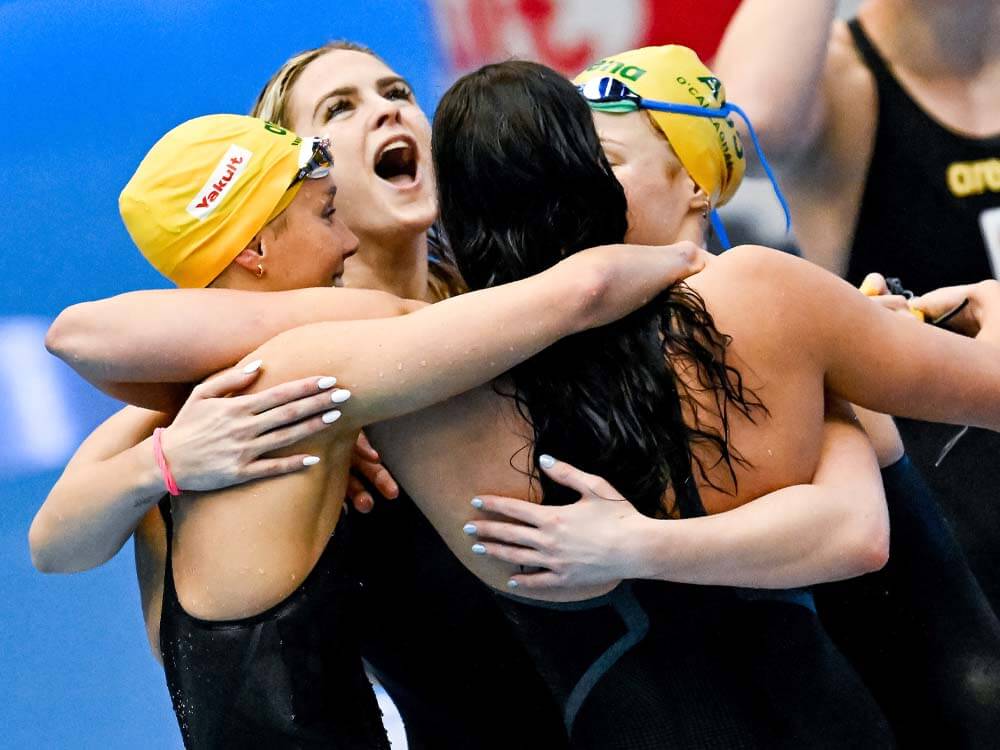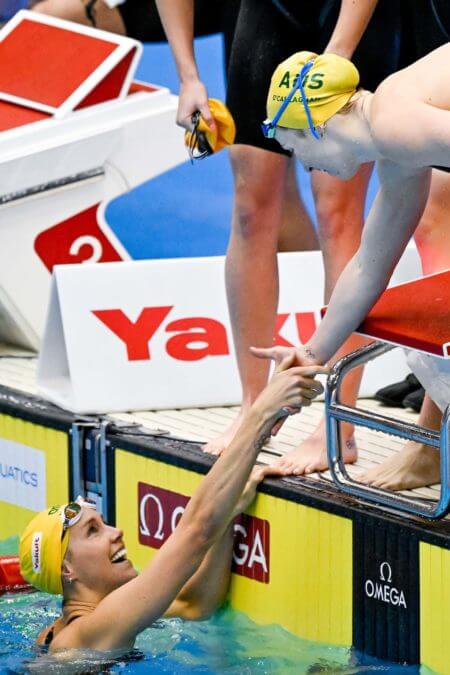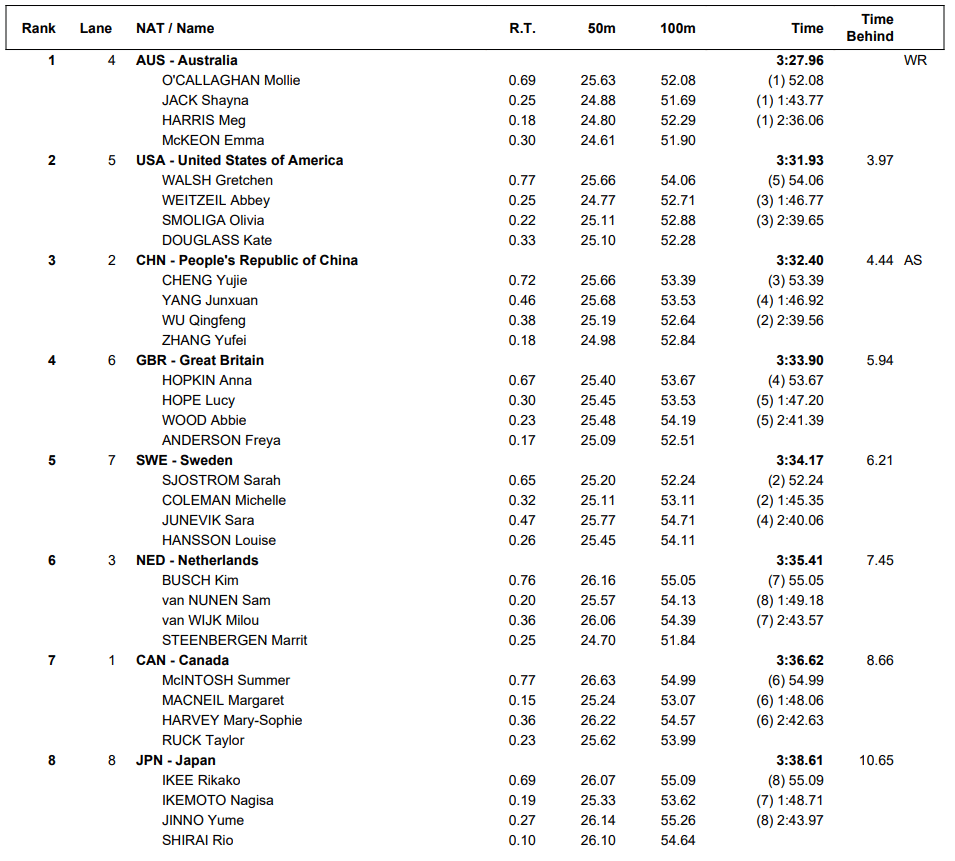World Championships, Day One Finals: Australian Women Obliterate 400 Freestyle Relay World Record

Editorial content for the 2023 World Aquatics Championships is sponsored by FINIS, a longtime partner of Swimming World and leading innovator of suits, goggles and equipment. World Championships, Day One Finals: Australian Women Obliterate 400 Freestyle Relay World Record Australia in the women’s 400 freestyle relay? That can only mean a dominant performance incoming. Dating back to 2012, Australia has captured three consecutive Olympic gold medals in the event plus four world titles, with the only two defeats coming in close finishes against the United States. But this time, the group of Mollie O’Callaghan, Shayna Jack, Meg Harris and Emma McKeon put forth a relay that bordered on perfection. The squad that earned Olympic gold in the women’s 400 freestyle relay at the Tokyo Olympics two years ago was an all-star squad. Sisters Bronte Campbell and Cate Campbell had both captured individual world titles in the 100 free while McKeon was days away from becoming the second-fastest performer in history on the way to Olympic gold. That team set a world record at 3:29.69, becoming the first team to ever crack 3:30. And this group, with no Campbell sister in sight, swam almost two seconds faster. The Aussies were certainly capable of that sort of effort if each swimmer swam their absolute best, but the nerves of a World Championships final often knock one or two swimmers off their A-game. Not this time. O’Callaghan went out in 52.08, knocking four tenths off her own best time and moving into a tie for sixth in history. She touched just ahead of Sarah Sjostrom, the Swedish world-record holder in the 100 free. Jack, who led off in an identical 52.08 in prelims, swam the fastest split of the entire race at 51.69 on the second leg, extending the lead to 1.78 seconds. Harris then provided a 52.29 third leg before McKeon came home in 51.90. That added up to an unthinkable time of 3:27.96. “I’m just over the moon for all of us,” Jack said. “I think for us to break the world record and have so many world records already broken before us, it was just an amazing feeling to get up there in the Green and Gold and experience it with those girls. I was personally happy to come away with that time of 51.6 in the end because this morning surprised me, and I was coming off a high from this morning and a quick turnaround. To get my hand on the wall with 51.6 and give these girls the best shot to come home strong. That’s what I did. We all put together a great swim.” Mollie O’Callaghan (right) congratulating Emma McKeon after earning 400 freestyle relay gold — Photo Courtesy: Andrea Staccioli / Deepbluemedia / Insidefoto O’Callaghan’s form entering Worlds had come into question after she suffered a knee injury last month that severely hampered her training. But she pulled through with a best time, and the 19-year-old moves into her individual 200 and 100 freestyle races among the favorites for gold. “Our team is just amazing, having that support, and I think that really pushes me to go on this 100 and try to get first onto the wall and try and get as much of a lead as I can for the girls,” O’Callaghan said. “Going into this, had a lot less pressure than I thought. Still a lot. I just wanted to have fun with it.” After O’Callaghan’s leadoff leg, there was no doubt that it was a race for silver, with no one capable of closing down on the Aussies. The United States had been favored for silver, but Gretchen Walsh led off in 54.06, much slower than her best time of 53.14 from U.S. Nationals. That left the Americans in fifth and fighting to catch up. Abbey Weitzeil contributed a strong 52.71 second leg to move into third behind Australia and Sweden, and Olivia Smoliga swam her career-best split for the second time in a day as she split 52.88. The Americans passed Sweden on that leg, but a 52.64 split from Wu Qingfeng moved China into the second spot. That left it up to Kate Douglass and Zhang Yufei on the anchor legs, and it was Douglass delivering a 52.28 homecoming split to pull the Americans back into the second spot. The U.S. finished in 3:31.91, almost four seconds behind Australia and a half-second clear of the 3:32.40 that the Chinese team of Cheng Yujie, Yang Junxuan, Wu and Zhang posted for bronze. While the American women earned a medal in the event for a seventh consecutive World Championships, this was only China’s second appearance on the podium for the 400 free relay in World Championships history following a gold at the 1994 Worlds. “I think medaling is always the goal for Team USA,” Weitzeil said. “We’re always shooting for gold, and we knew it was going to be a challenge out there. Props to the Australians. They are always an amazing, amazing team. We really had some girls step up. Some splits were amazing out there. I’m really proud of us, and I think a lot coming for Team USA. It’s only day one, and we’ve got some medals in the books, so more to come for sure.” Great Britain finished fourth in 3:33.90, with Freya Anderson supplying a 52.51 anchor leg, while Sweden ended up fifth in 3:34.17. The Netherlands swam in the back of the pack for much of the race until Marrit Steenbergen, fresh off qualifying third for the 200 IM final, hammered a 51.84 anchor leg to pull her country into sixth. In recent years, no country has dominated a relay like the Australian women have done in this event. Maybe the U.S. men in the 400 free relay, but that win streak ended Sunday as Australia powered to gold in the men’s event as well. Here, Australia’s team that displayed such dominance over the field left off Madison Wilson after she anchored in 52.74 in prelims, a split that every other team in the race would have happily welcomed. “Every year, the 4×1 girls, I feel like we just get more and more depth in Australia. We’ve got such a wide array of people that we can put in. To have the two girls this morning swim so quick, it makes it a hard team to pick for tonight,” McKeon said. “The 3:27, I wasn’t thinking about a time, to be honest. To turn around and see a world record, and then to see what we dropped it to, it’s just so impressive.”









Pride & joy for the Aussies to win & with a bonus of a world record.